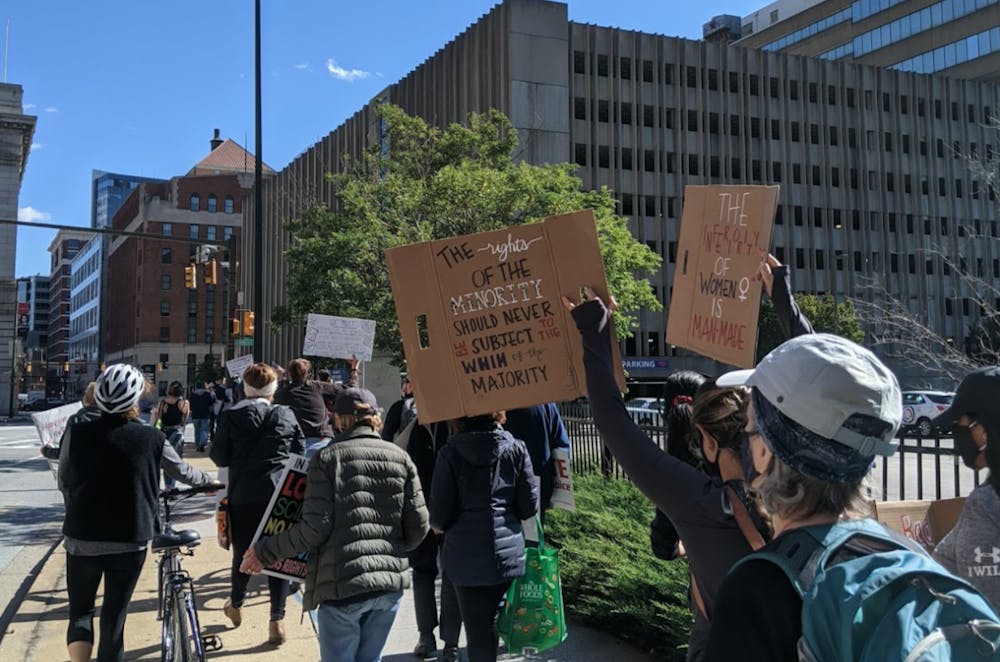Baltimore Women United, along with a number of other women’s rights and progressive organizations, hosted the 2020 Baltimore Women’s March on Saturday, Oct. 17. The event, which coincided with nearly 400 other Women’s Marches across the country, used the slogan “March. Dissent. Vote.”
About 200 protesters marched from the courthouse on West Lombard Street to City Hall. Many carried homemade signs with slogans such as “Insist, Persist, Resist” and, in honor of the late Supreme Court Justice Ruth Bader Ginsburg, “Now we must be Ruthless.” Some wore pussyhats, first popularized by the 2017 Women’s March.
While marching, protesters chanted slogans such as “Vote him out” and “No confirmation until inauguration.”
At City Hall, protesters gathered to listen to eight speakers. Giuliana Valencia-Banks of Baltimore Women United emceed the event.
Valencia-Banks introduced several themes of the march, including voting, dissenting from the status quo, fighting for racial justice and fighting for the victims of COVID-19.
“Simply saying ‘we dissent’ is not enough,” she said. “Dissent not only means the act of disagreeing but the action you take as a result of the disagreement with the majority or those in power.”

COURTESY OF ARIELLA SHUA
Co-sponsors of the march included NARAL Pro-Choice Maryland, Planned Parenthood Advocates for Maryland, D.C. and Northern Virginia, Latino Racial Justice Circle, Comité Latino de Baltimore, Building Our Nation’s Daughters, Baltimore Rising and Baltimore County Youth Speaks.
17-year-old Noureen Badwi of Baltimore County Youth Speaks was one of the speakers at the march.
“I am a young woman, an immigrant, an advocate and a daughter,” she said.
Badwi explained that her mother had migrated from Egypt to the U.S. because she did not want her daughter to face challenges due to her sex. She praised America for its accomplishments but noted that the movement for women’s equality in the U.S. is still far from over. She cited sexist remarks made towards Ginsburg and Representative Alexandria Ocasio-Cortez as examples of female leaders not being able to escape scrutiny for their gender.
“We have been fighting this fight for equality and respect from our male peers for centuries,” she said.
Between speakers, singer-songwriter SONiA from the band Disappear Fear provided musical interludes to the speeches. One song urged kindness and consciousness to help end the pandemic. Another criticized U.S. President Donald Trump.
The 2020 Women’s March was not SONiA’s first performance. In an interview with The News-Letter, she explained that she has been playing at feminist marches since 1989.
“I remember being in New York City and demonstrating against [Supreme Court Chief Justice] John Roberts,” she said. “Of course, he did get appointed, but there was a big rally in the park, just like this.”
Several speakers pushed back against the nomination of Judge Amy Coney Barrett to the Supreme Court. Barrett was nominated by Trump to fill the seat vacated by Ginsburg following her death on Sept. 18. The Senate will vote to confirm Barrett on Monday.
Several speakers noted that Ginsburg was a pioneer of women’s rights and gender equality. They contrasted her with Barrett, who has indicated that she may severely limit legal abortion access.
Brittany Oliver, founding director of Not Without Black Women, criticized Barrett for refusing to answer questions on topics such as climate change during her nomination hearing. She then criticized the Trump administration for attempting to push through a Supreme Court justice mere weeks before the presidential election.
“If this administration truly cared about the American people, they would hold these hearings, wait until after the election to confirm a new Supreme Court justice and prioritize passing another stimulus package for struggling Americans in this country,” she said.
Protesting Trump’s presidency was the catalyst for the inaugural Women’s March. Planned across social media after Trump won the 2016 presidential election, marches were held across the country the day after Inauguration Day. Similar marches now take place semiannually. Women’s March is led by guiding principles such as reproductive rights, LGBTQIA rights and civil rights.
Junior Ilana Inselbuch attended the event to show her support for all human rights.
“I believe our voice is powerful, even though we feel so small,” she said in an interview with The News-Letter. “Every vote and every voice matters.”
The sentiment was echoed by multiple speakers throughout the event. Oliver urged attendees to remember that Ginsburg wanted everyone to vote.
“Voting is not just about me,” she said. “It’s about my family, it’s about my friends, it’s about my community. It’s about people who live in other parts of this country who I don’t even know that I will still advocate for.”
SONiA noted in an interview with The News-Letter that she finds inspiration for her songs and an urge to make change just by observing the world around her.
“I’ve always felt that if we listen to what’s going on, we’re gonna have a chance to have our voice heard,” she said.
Badwi noted that it is future generations who can bring about lasting change.
“It is my hope that my generation of young people, when we eventually become the elected officials, that we will continue to build on the momentum of social justice movements that we grew up with,” she said.





